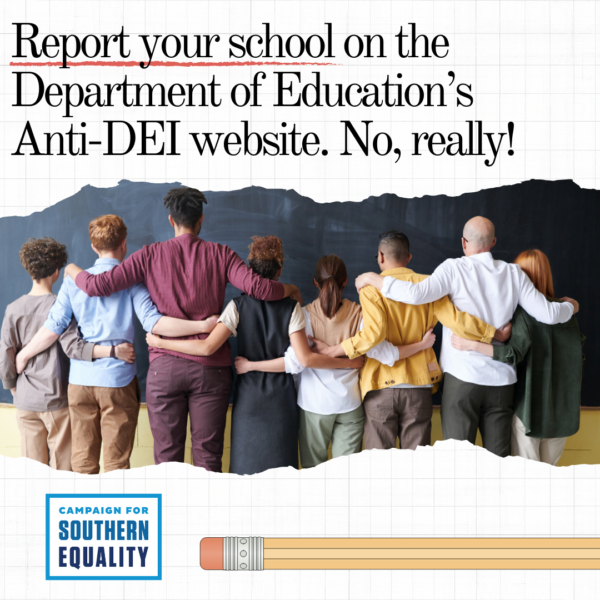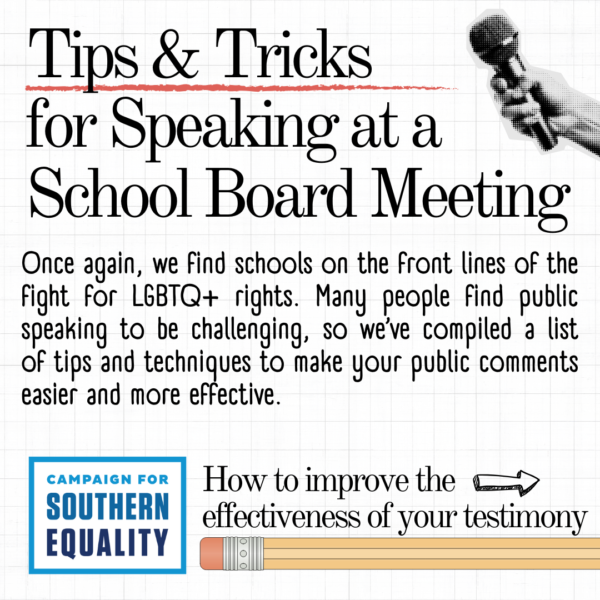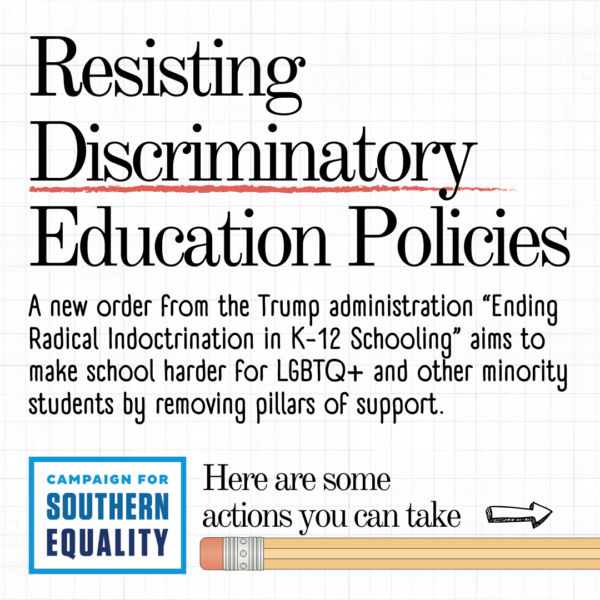Navigate This Page:
➡️ Core Program Priorities
➡️ The Latest
➡️ Teachable Moments
➡️ How to File A Title IX Complaint
➡️ Resource Hub: S.B. 49
➡️ Using Professional Ethics to Protect Yourself and Your Students
➡️ Supportive Schools Guide for LGBTQ+ Students
➡️ Past Work
Every school, every home, and every community should give every child the message that they are safe, respected and loved for exactly who they are. The Supportive Schools Program provides training, policy guidance, and assessment services to assist schools in becoming more inclusive and welcoming for students of every sexual and gender identity. Through the program, CSE also advises and advocates on other LGBTQ youth-related issues and policies, and supports the formation and networking of school GSA’s and other youth organizations.
Core Program Priorities
Supporting Local Organizing
Most of the progressive change happening in Southern school districts stems from the local organizing efforts of students, educators, parents and guardians. The CSE Supportive Schools staff support these local organizers by providing guidance, advice and support, connecting them with other resources in their state or region, offering opportunities to apply to the Southern Equality Fund, and using our communications platforms to share their stories and successes.
Policy Guidance and Advocacy
In the past, many schools have not had clear policies on how to protect and support LGBTQ students. As young people come out in record numbers, even in politically conservative counties, many school districts are struggling to become be a safe and affirming place for all their students. We are happy to provide models of LGBTQ-inclusive policies from other schools and school districts, provide guidance on how to implement these with a minimum of conflict, and offer suggestions for best practices from the classroom to the school to the district level. In some cases, our team is also able to provide support or guidance to individual students, families, or educators who are experiencing discrimination.
Targeting Anti-LGBTQ State Laws
The Campaign for Southern Equality is always scanning for opportunities to repeal or strike down anti-LGBTQ laws, and we have worked specifically on litigation centered on the freedom to marry, the freedom to adopt, and anti-LGBTQ laws like SB2 in North Carolina and HB1523 in Mississippi. We are also eager to explore challenges to anti-LGBTQ curriculum laws, which are on the books in South Carolina, Texas, and Alabama. These laws create a negative climate for students and block critical learning opportunities for young people considering their LGBTQ identity, often for the first time.
The Latest from Supportive Schools
Teachable Moments: Using Public Comments As An Opportunity to Educate Your School Board About LGBTQ+ Identity
Across the South and around the country, students, parents, and school employees are standing up at school board meetings to advocate for LGBTQ+ inclusion. Often when we make these public comments, we are asking the school board to do something to increase LGBTQ+ inclusion at our school. This is our right and our responsibility. However, we sometimes forget that many school board members do not know enough about LGBTQ+ identity to make an informed decision about LGBTQ+ inclusion. We know that the more people know about who we are as LGBTQ+ people, the more likely they are to support us. That’s why the Supportive Schools team at Campaign for Southern Equality has created “Teachable Moments”; scripts for talking to your schoolboard about different aspects of LGBTQ+ identity. Check out the library below of different Teachable moments scripts you can adapt and use at your school board meeting.
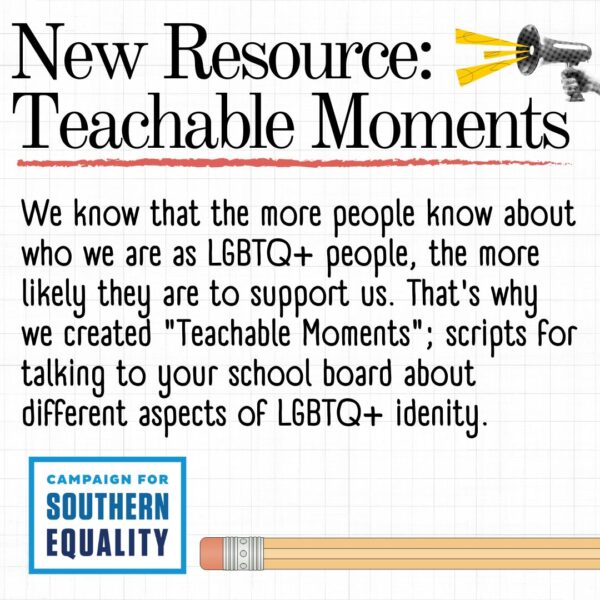
How to File A Title IX Complaint
School should be a safe, affirming place to learn and work for all students and staff. Federal civil rights laws protect students, staff, and faculty from discrimination at any institution that receives federal funds. Learn how to protect the rights of students by filing a Title IX Complaint with our “How to File A Title IX Complaint” resource page.

Resource Hub: S.B. 49, North Carolina’s ‘Don’t Say LGBTQ’ Law
Senate Bill 49, also known as North Carolina’s “Don’t Say LGBTQ+” bill, was enacted in August 2023 following the NCGA’s override of Governor Roy Cooper’s veto. The anti-LGBTQ+ curriculum censorship and school policy law is a cruel attack on LGBTQ+ students and educators. Its implementation is currently being determined by individual school districts in North Carolina, and it’s up to all of us to push back, speak out, and take action against this shameful law.
This S.B. 49 resource hub compiles information about the law, why it is in stark violation of federal law, and how you can take action.
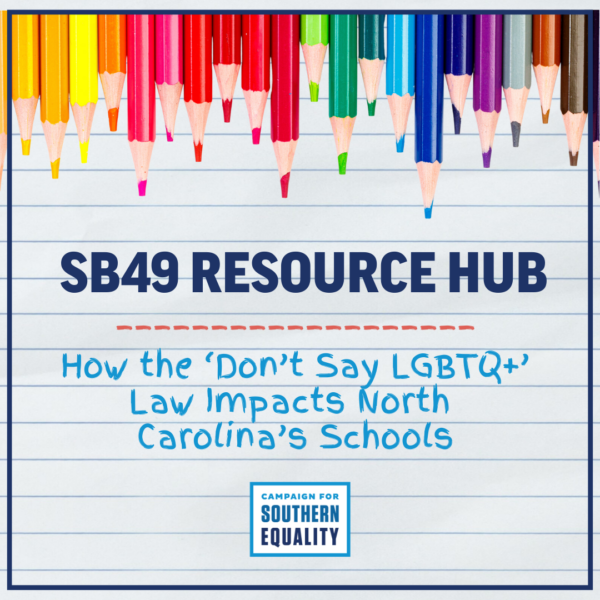
Using Professional Ethics to Protect Yourself and Your Students from Discrimination
One of the most important tools educational professionals can use to protect themselves and their students from discriminatory policies is their code of ethics, which they can cite as justification for refusing to comply with laws or policies that they find unethical. This resource provides information on several professional codes of ethics that school employees and other professionals may use to resist unethical policies and practices. It also includes information about how to file a complaint for unethical conduct, for parents and students and colleagues who experience professionals who are violating their code of ethics.
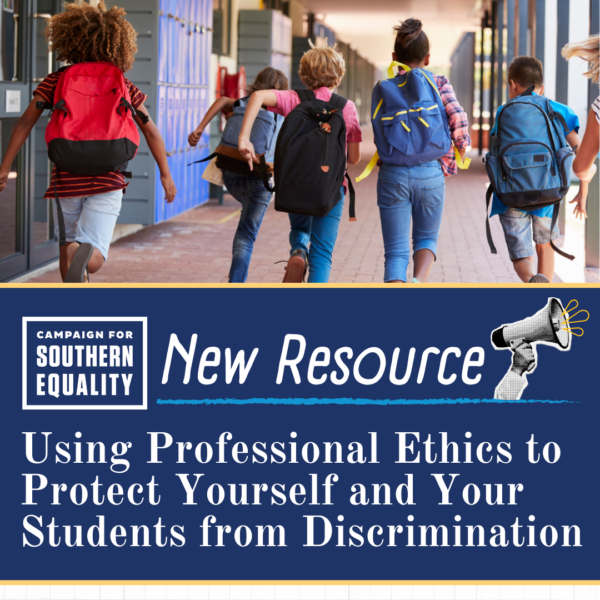
Supportive Schools for LGBTQ+ Students: A Guide to Policies and Best Practices
Supportive Schools for LGBTQ+ Students: A Guide to Policies and Best Practices, published September 2022, provides recommendations for schools that are seeking to create safe and supportive educational environments for all of their students, including students who identify as LGBTQ+.
This guide is written for anyone who shapes or is affected by policy and practices at K-12 public, private, and charter schools in the United States, with a particular focus on schools in the Southeast. Administrators and school board members are encouraged to use it as a guide to crafting or revising school and district policies. Students, family members, teachers, and other school staff are encouraged to use it as a ‘know your rights’ resource and as a tool for advocacy with a school or district.
Note: Between state laws, federal laws, court rulings and executive orders, the legal landscape regarding the rights of LGBTQ+ students at school is constantly changing. The recommendations in this guide are offered as research-based best practices, but they may or may not be legally available, depending on your state. We recommend checking with local LGBTQ+ organizations, watching CSE’s social media, or checking with the Supportive Schools team for the most current information.


